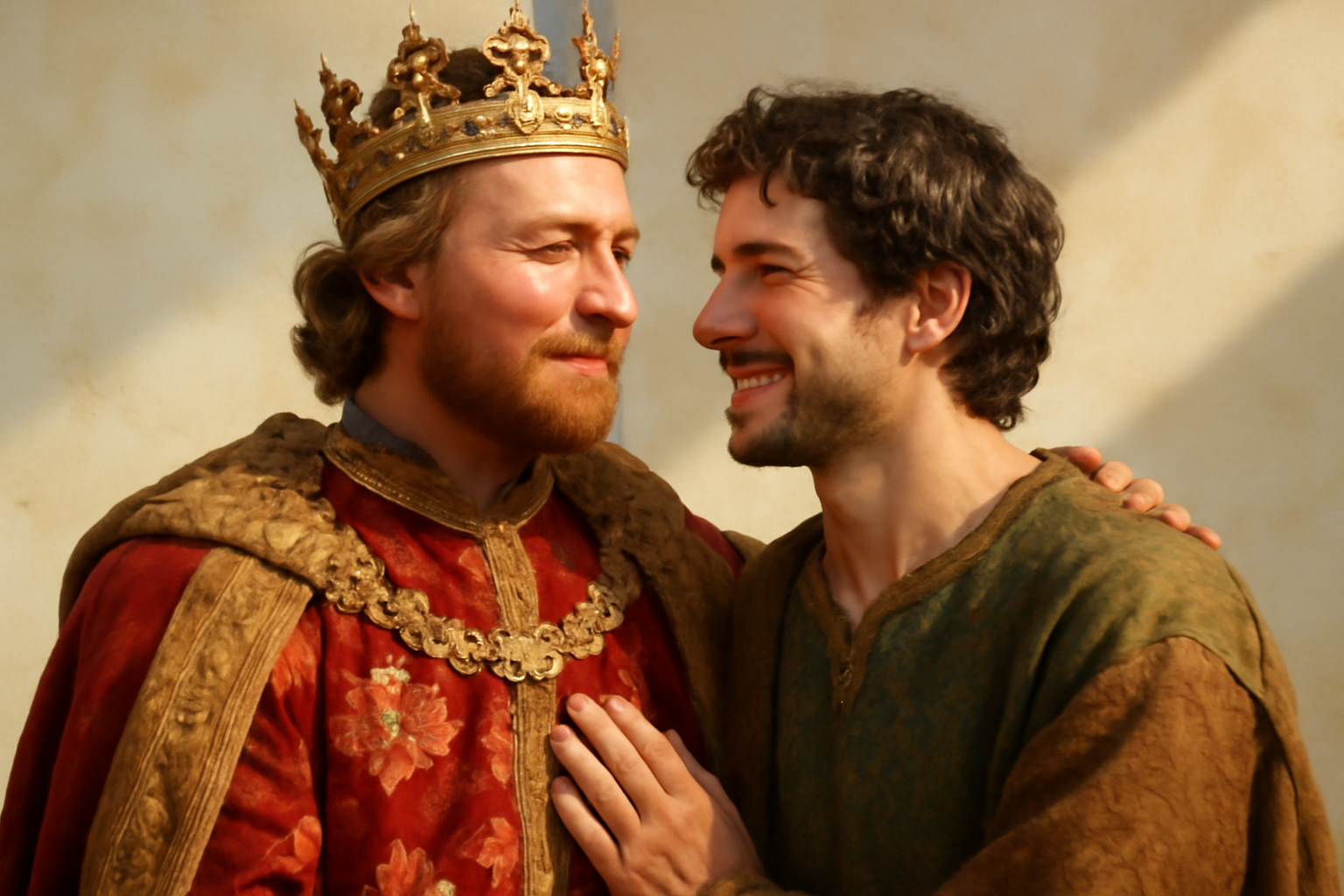
The Royal Shakespeare Company (RSC) is staging Christopher Marlowe’s renowned play, "Edward II," which explores the life of a medieval English king who chose love over power. Edward II, who reigned from 1307 to 1327, became the first English monarch to be deposed. He is remembered for the significant influence he granted to his favorite, Piers Gaveston, the nature of which has long intrigued historians.
While some have historically downplayed their relationship as mere friendship, recent scholarship presents a different perspective. Chroniclers from the period noted Edward’s affection for Gaveston as "beyond measure," and some sources even allude to Edward engaging in "the vice of sodomy." Such descriptions suggest a romantic connection, rather than just camaraderie, resonating with the broader theme of queer love throughout history.
Christopher Marlowe, the Elizabethan playwright behind this depiction, is believed by many to have had his own personal connections to queer themes. Marlowe, often rumored to be a heretic, a spy, and a sodomite in Elizabeth I's England, infused "Edward II" with bold queer narratives, making it a seminal work that challenges traditional portrayals of masculinity and power.
The play features poetic exchanges between Edward and Gaveston, underscoring their deep connection. Gaveston speaks of being so compelled by Edward’s "amorous" call that he would swim from France just to receive Edward’s embrace. Such declarations, steeped in romance, extend beyond platonic friendship.
Upon reunion, Edward’s words to Gaveston—"Kiss not my hand: Embrace me, Gaveston, as I do thee"—further highlight the depth of their bond. These interactions, coupled with gestures like exchanging jewelry, allude to a commitment akin to that of partners, rather than mere "gal pals." The contemporary comparison to figures such as Virginia Woolf and Vita Sackville-West, or "Modern Family’s" Mitch and Cam, illustrates this dynamic vividly.
Revisiting Historical Queer Erasure
Throughout history, the romantic elements of Edward and Gaveston's relationship have often been minimized or dismissed. However, the RSC's production of "Edward II" seeks to rectify this. Daniel Evans, who portrays Edward II, highlights the play’s explicit queerness, remarkable for a work first staged in 1593. The production, directed by Daniel Raggett, emphasizes the romantic and political nuances of the play, challenging reductive stereotypes often associated with male homosexual relationships.
Evans notes the enduring presence of homophobia, drawing parallels to modern political climates. Censorship and attempts to erase queer narratives, both in history and current policies, mirror past efforts to downplay Edward II’s queerness. This production, however, embraces the full spectrum of human experience—love, hate, heartbreak, and joy—within the queer context.
Raggett points out that while the play is about a queer king, it transcends his sexuality, exploring broader themes of power, identity, and resistance. This narrative remains vital, especially in a modern society that often feels regressive in its treatment of LGBTQ+ rights.
The RSC’s "Edward II" exemplifies a resistance against erasure, celebrating queerness as an integral part of historical narratives. It serves as a reminder that queer stories, like that of Edward II, are essential cultural touchstones that challenge societal norms and provoke thought.
"Edward II" is being performed at the Swan Theatre in Stratford-upon-Avon until April 5. This production not only revitalizes Marlowe’s text but also asserts the timeless relevance of queer history and its ongoing role in the cultural discourse.
Related Posts
Triumphant Trans Woman Wins Legal Battle and Inspires Others to Stand Up for Their Rights
Breaking new ground: a landmark victory in transgender rights After battling in courtrooms and enduring endless challenges, Diana Portillo, a transgender woman, has secured a monumental victory in her decade-long fight against workplace discrimination. The result? Nearly $1 million awarded in a historic settlement. But this isn't just a win on paper—it represents a powerful precedent in combati [...]
Pride Month in Latin America: Protests and Demands for Equality
**Celebrating Pride and advocating LGBTQ+ rights in Latin America** Pride Month in Latin America was a lively mix where celebration met activism. Communities united, not just throwing a party but making a stand—demanding equality and pushing governments toward better protection and rights recognition. Throughout Latin America, pride events erupted in marches and cultural displays, each with a c [...]
Transgender Erasure Actions Implemented by National Park Service
```html Trump administration's impact on national park service and transgender recognition The Trump administration made notable moves in undermining transgender representation, which included directing agencies like National Park Service not include "T" and "Q" when they refered “LGBTQ” in any official communication. This move seems part a broader plan by this administration aimed at reducin [...]